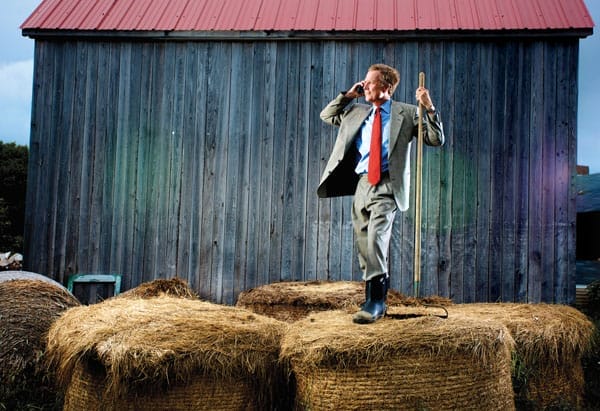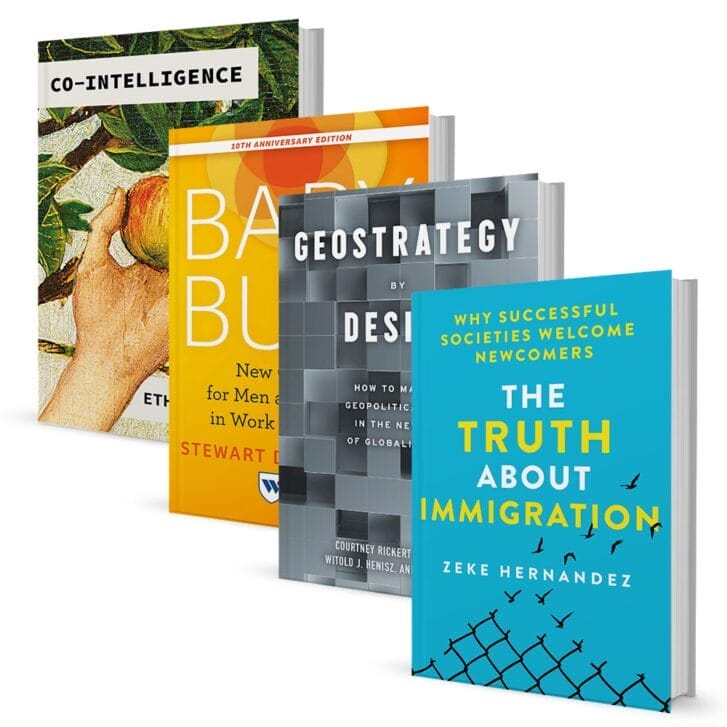Two years ago, fast food restaurants like McDonald’s began introducing fresh fruit smoothies to their menus. For most consumers, this was a non-event, but in the world of agriculture, these smoothies threw open the door to a host of new business opportunities. Since the middle of the 20th century, fast food corporations have generated reliable and substantial demand for beef, tomatoes, lettuce, potatoes and numerous sectors of the farming industry. Now, the supply chains that deliver the ingredients for a Big Mac are extending farther afield, reaching, among other places, to the shores of Africa’s Lake Malawi, where millions of wild mango trees have suddenly become the source of a global commodity.
Tanek Amin, WG’05, is in the middle of this emerging market. As chief financial officer of Malawi Mangoes Ltd., Amin is developing a scalable business model based on the approximately 4 million wild mango trees owned by smallholder farmers along the shores of Lake Malawi in sub-Saharan Africa. At the moment, about 75 percent of the fruit is wasted because no fruit processing facilities exist in Malawi and the mango varieties grown have limited commercial use to begin with, according to Amin.
Malawi Mangoes has developed a multipart strategy for preventing the loss of this potential cash crop. If it works, it will not only generate revenue for the business, but also for thousands of Malawian farmers who currently earn little to no income from their trees. .
The first step is perhaps the most challenging: Company representatives must convince the local farmers to allow their trees to be grafted with the mango varieties that are most valuable on the global export market. This means removing the tops of the trees and attaching new scions—the branching portion—to existing rootstock.
“Eighteen months after the graft, you have the type of mango that is demanded by international fruit drink manufacturers,” Amin says.
Malawi Mangoes guarantees the farmers that it will buy that fruit if the farmers are willing to endure the transition.
“We’ve rolled out the program slowly, and they can see it works,” he says. While 18 months seems like a long time, Amin explains, most of the farmers along the lake are not making money currently. The gains they’ll enjoy once the grafts take hold are worth the wait.
“When you’re doing business in frontier markets or investing in them, it’s important to recognize that social and commercial returns go hand-in-hand,” Amin says, “By following an inclusive model, we’re able to scale the business while helping the farmers make income, which helps develop basic sanitation, education and health care in local villages.”
The company has also built its own 328-acre farm just three miles from the lake, ultimately aiming to grow half of its mango output itself. It plans to implement the first large-scale fruit processing facility in Malawi and then procure large volumes of fruit to process into a not-from-concentrate pulp. The likes of Coca-Cola, Pepsi and Innocent Drinks would be their target customers, he says.
In a few years, almost any processed mango beverage you purchase may contain fruit from the upstart Malawi company. Once Amin closes the last of three rounds of equity financing from his home base in London, he will move with his family to Lilongwe, Malawi, to be near the headquarters full time. It’s not a typical destination for a Michigan-born, Wharton-educated executive, but, after 10 years of working in investment banking in New York and London, Amin made a conscious decision to apply his business skills in the new frontier context.
Malawi Mangoes is a far cry from the common startup stories from the Silicon Valleys and Alleys of the world, but Amin points out that the company is launching within one of history’s most enduring industries, and one with a very interesting future.
“From a sector perspective, food production and processing will continue to grow and evolve as global food security becomes more important,” he predicts. “We have a growing population, which needs to be fed, and therefore we need to produce more food, in a sustainable manner, in a finite amount of space.”
Amin’s comment simultaneously reflects his confidence in the continued importance of farming and his awareness of the serious issues conspiring to put pressure on the industry. It’s impossible to speak with an agricultural professional without encountering concerns about population growth, sustainability and food security.
###

Craig Sams, W’66
For some Wharton alumni, the solution to these potential crises lies in the soil.
Craig Sams, W’66, has worked in food production in the tropics of Africa and Central America. As co-founder, with his wife, of the now-ubiquitous organic chocolate company Green & Blacks, Sams observed cacao farming practices for years before turning his entrepreneurial focus from the trees’ output to their growing medium. After selling his chocolate company to Cadbury Schweppes in 2005, he spent time with a group of farmers in Belize learning about biochar, an ancient soil improvement strategy purported to accelerate the maturation of cacao trees. Sams saw it work.
“Instead of taking seven years to bear fruit, they only took three years,” he reports. “That makes a huge difference.”
The improved financial outlook for farms that used biochar was just part of the picture that enticed Sams to start Carbon Gold, a company focused on soil research and product development. For the environmentally minded entrepreneur, the more important aspect was biochar’s potential to sequester carbon dioxide.
Biochar is made by burning agricultural waste products in an oxygen-deprived environment until it becomes porous, black, pure charcoal. In a farm field or garden, Sams explains, the tiny pores act like caves for fungi and bacteria that are critical to plant health. Also called terra preta or black earth, biochar is regarded as a miracle substance, promising to improve soil fertility, mitigate climate change and generate more abundant yields for farmers. According to Sams, research trials have also demonstrated that biochar reduces the need for fertilizer and irrigation, which could in turn reduce the cost of farming—a particular benefit for developing regions.
Ever at the leading edge, Sams felt enough research had been done to warrant real-world market testing, and Carbon Gold is retailing biochar under the name Grochar.
“We have the two-edged sword of firstmover advantage,” he remarks. “We’re getting a brand out there and are ahead on commercial trials, but we’re also making all the mistakes first. People sit back, watch me screw up then dive in once the market is ready.”
If his track record with Green & Blacks is any indication, however, Carbon Gold and biochar could have a thriving future ahead.
Yet the business of improving soil is not an easy one. In addition to conducting extensive, ongoing scientific research, companies that enter this arena have the secondary hurdle of convincing farmers that their product is an advantageous supplement—or even alternative—to fertilizers they’ve depended on for years.
Serial entrepreneur Louis H. Elwell III, W’84, knows this challenge well. After working in the energy and waste management sectors for more than two decades, Elwell launched a new company called Bio Soil Enhancers, which manufactures products containing Sumagrow and applies much of his R&D from previous endeavors to the task of growing food.
The core of Elwell’s bio remediation operation had been the cultivation of microbes that eat discarded grease from restaurant kitchens (and even sewage). That operation was hampered when Hurricane Katrina blew the roof off of their Biloxi, MS, headquarters in 2005. Upon recovery from the storm, he and his partner decided that agricultural microbes were the company’s future.
Like biochar, Sumagrow’s list of potential benefits to farmers seems almost too good to be true. And yet they simply describe a healthy, natural plant environment. Unfortunately, long-term use of fertilizers has in many cases compromised environments, diminishing nutrients and causing groundwater contamination and soil erosion.
“Nobody fertilizes the Brazilian rainforest, but it’s pretty darn lush,” Elwell says. “We’re going back to the way Mother Nature designed the system to work, so that microbes can extract nitrogen from the air and make nutrients in the soil available to plants.”
Of course, to create a unique selling proposition, Sumagrow had to improve on nature just a touch by optimizing naturally occurring microbes into an especially effective formulation. Elwell has third-party studies documenting that Sumagrow increases crop yields by 10 to 20+ percent, cuts down fertilizer use by a minimum of 50 percent, reduces pest problems, lowers water demands and decreases harmful nitrate run off by approximately 70 percent. According to a Popular Science article, the product can “simultaneously reduce the need for phosphorus and nitrogen fertilizers, protect plants against pathogens and boost yields in virtually every type of crop.” In field experiments, “tomato plants fed with [these] microbes produced nearly 90 percent more fruit.”
These tremendous productivity boosts are particularly noteworthy in the face of global food insecurity and population growth. Aiming to counter any skepticism, Elwell has sent Sumagrow to 37 countries to let farmers see the effects with their own eyes.
He seems unconcerned that he may be playing David to many agribusiness Goliaths.
“We really believe the product is going to change how and how much the world grows,” he says, “The farmer wins because they make more money; the consumer wins because they get better tasting, more nutritious produce at a lower cost; the environment wins. The only people that lose are the fertilizer companies.”
###
Peter White, WG’75, has been working on emerging market agribusiness investment and policy for many years. White first developed an interest in global farming issues while working with the Peace Corps in Chad and Cameroon in West Africa. He later attended Wharton to acquire management and technical skills to apply to private-sector agribusiness development. He worked for Citibank and then the World Bank’s International Finance Corporation (IFC) until he hit the IFC’s mandatory retirement age. The urgency of global food issues continues to drive him, so he now works as a consultant for the World Bank Group, USAID, and the Bill & Melinda Gates Foundation, among others.
“I’m concerned with how we can boost production and delivery of agricultural products to serve the needs of an expanding population,” says White. “In order to feed the ultimate market, we look at agriculture on a value chain basis, starting at the availability of land … to the procurement of inputs … production, and right through to processing, distribution and retailing.”
One of White’s preoccupations is improving nutritional output per a given piece of farm or pasture land. With available production area declining, he says, the mix of crop must be decided not only on potential volume, but also on their well-balanced nutritional value.
“Within that equation, one must address the markets and what consumers are looking for. … Then you have to factor in water, soil, climate change and infrastructure conditions, so it becomes this very complex equation of trying to extract as much output as the farmer can out of the limited resources available—and at the same time make a sustainable profit,” he asserts.
Having spent decades working on and observing agricultural successes and failures in Africa, White remains optimistic about the continent’s capacity to produce enough food to feed a projected 2 billion population by 2045; however, he is troubled that countries’ citizens don’t fully sense the urgency of the situation.
“We have a time bomb here, especially in the new mega-cities” he says.
Rising prosperity among populations as a whole and, especially, the growing middle class is furthermore leading to changes in eating habits, with consumers demanding more variety of food, particularly meat. This means that the food and nutrition demands are outstripping population growth. Food demand in Africa will double in less than 25 years. While daunting, this market offers high returns to small and large investors alike.
###
For established farmers, keeping production on pace with rising demand will be particularly challenging as climate change introduces unpredictable environmental impacts and changes the conditions of the land.
“We are currently experiencing dramatic weather factors all over the world,” says Jorge Born Jr., W’83, whose family has managed massive South American farms and global food businesses for generations, “and the consequent extreme volatility in the markets is a feature that we will have to learn how to deal with.”
Part of that adaptation process involves deploying new technologies. Using GPS-guided farm equipment has enabled his operations to become more precise, efficient, and sustainable, says Born, president and CEO of Bomagra. High-speed, networked communication has accelerated the transfer of research-based knowledge into the field. And biotech is facilitating great leaps in their production capacity—more than 300 percent.
“We must insist on preserving and improving our farms’ productive capability for future generations,” Born says, “in order to supply the requirements of an ever more demanding world consumer.”
The rising demand for meat works out well for Born’s company. One of their primary interests, in addition to oilseed, biofuels, animal feed and consumer food staples, is beef. They manage 40,000 heads of cattle throughout Argentina, marketing primarily within the country, which has one of the world’s highest per capita consumption rates for meat.
The livestock owned by Born’s company does not end up in your McDonald’s burger. But if you visit an upscale restaurant chain in Brazil or the U.K. in the future, you may be served premium beef from Born’s Argentine herds. “We are aiming to introduce our products, based on their organic origins, traceability through the whole production chain and impeccable health credentials,” Born says. “We try to leverage the size of our herds by having direct discussions with restaurant chains, as this is almost impossible to do by the smaller producers.”

Ben Carter, WG’83; Photo credit: Eric Millette.
While Born’s affairs span the globe, with more than 10,000 employees across various divisions, large-scale (or massively scalable) agribusiness is not the only way agriculturally inclined Wharton alumni carve out a livelihood. Ben Carter, WG’83, grew up on a family farm and became a farmer to cultivate acreage in California’s prolific Sacramento Valley that originally belonged to his parents.
“My father said I went to school on a cucumber-seed scholarship,” he laughs. After earning his MBA, Carter worked in management consulting for the energy and technology sectors, landing in Apple’s finance and operations department before deciding to go back to the land. He now farms 3,000 “highly diversified” acres, producing 20 to 30 different crops each year, including melons, corn, dried beans, wheat, rice, nuts and orchard fruit. And while he’s the head of the operation, he’s still in the field every day.
“My MBA enabled me to make a career path change from engineering to something broader. It was an enabler. At this point I’m in agriculture, and I love it, and I think agriculture is a great way of life and a noble profession,” Carter says.
Carter’s sentiments about farming echo Amin’s to some degree: Carter views agriculture as a good sector to be in: “Ag may not be as lucrative as other industries that Wharton grads may consider, but during the last four years, it has been good to us.
“Agriculture is a very cyclical business,” he observes. “Classically, it’s about a 10- or 12-year swing, based on the economics of the business. Some years farming is profitable, and some years it’s not.”
Carter manages some of the financial risks through the diversity of the operation.
“We never hit a home run, but we don’t get shut out either because one commodity tanks,” he says.
Listening to him speak, it’s immediately apparent both that he’s been in the industry for a long time and that he isn’t planning an exit.
This attitude may seem unfathomable to a young MBA entering a professional climate where great fortunes are made on virtual goods in less time than it takes a melon to ripen. But it’s not strictly the outlook of the pre-iPhone generation. For someone like Amin, the Internet-enabled, socially networked world is an integral part of a modern career in agriculture. His approach to Malawi Mangoes is not dissimilar from the approach many of his peers took as they launched mobile apps and digital properties in their first years out of school. The main difference, other than the fact that his currency is a sweet orange fruit, is patience.
“At the end of the day,” he muses, “you look at certain demographic trends, globalization and other macro things going on in the world, and agriculture comes up again and again as something that will always be there. It’s always going to be good, it will endure and evolve, and there will always be opportunities.”


























